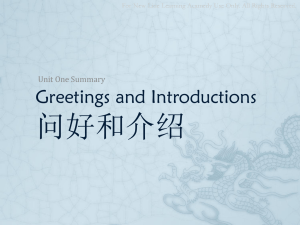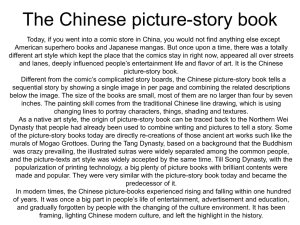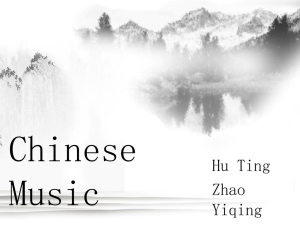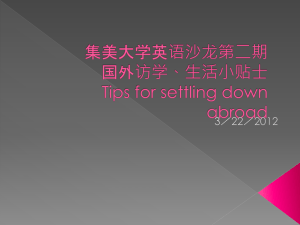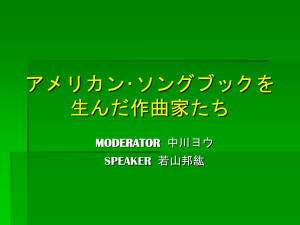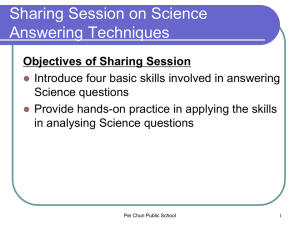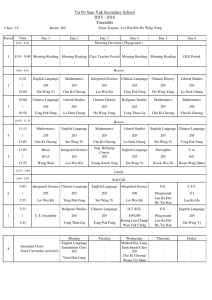校長的祝願:國慶六十一週年誌慶Good Wishes from the Principal
advertisement
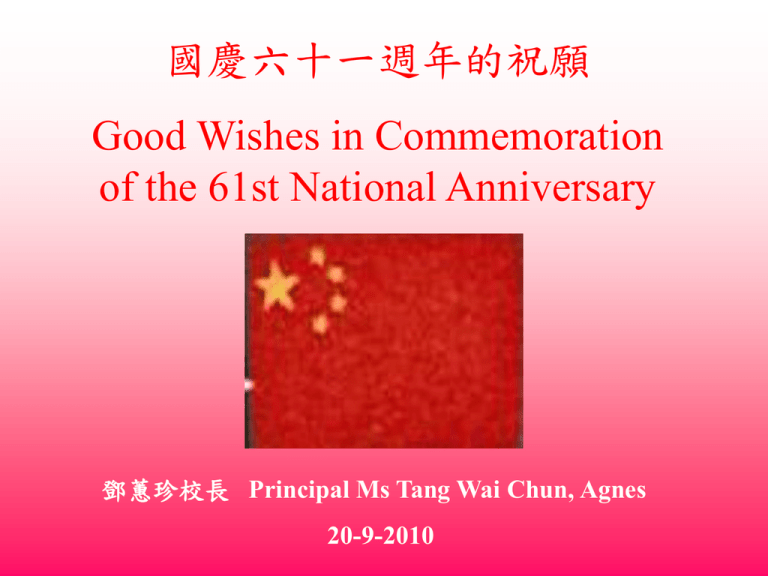
國慶六十一週年的祝願 Good Wishes in Commemoration of the 61st National Anniversary 鄧蕙珍校長 Principal Ms Tang Wai Chun, Agnes 20-9-2010 Be a Dutiful Chinese Nationals 中國公民的責任 “Get to know your country, love your country, prepare to dedicate yourselves to the service of your country, and link your career to the development of the country as a whole”. 「知國之情、愛國之心、 報國之志、效國之行」。 Responsibility of a “Lobal Citizen” 「世界公民」的責任 (LOBAL: Local & Global) A good citizen who “is firmly rooted in Hong Kong, is committed to his home country and has an international outlook.” 「立足香港, 心繫祖國, 放眼世界」 的好公民。 Good Citizen 良好的公民 “Ask not what your country can do for you , ask what can you do for your country.” 「不要問國家能為你做什麼事, 要問自己能為國家做些什麼事」。 Former US President John F. Kennedy 前美國總統約翰甘迺迪 中華人民共和國成立 六十一週年國慶教育系列 EDUCATION SERIES TO MARK THE 61st NATIONAL ANNIVERSARY ON THE FOUNDING OF THE PEOPLE’S REPUBLIC OF CHINA 鄧蕙珍校長 Principal Ms Tang Wai Chun, Agnes 20-9-2010 六十一年前,中華民族的理想曾經透過擴音器 感動天安門外每個中國人。我們重溫國歌 《義勇軍進行曲》,就會明白當時中國人的 期望和理想。歌詞是這樣的︰ 起來!不願意做奴隸的人們! 把我們的血肉,築成我們新的長城! 中華民族到了最危險的時候, 每個人被迫發出最後的吼聲, 起來!起來!起來!我們萬眾一心, 冒著敵人的炮火前進, 冒著敵人的炮火前進!前進!前進!進! Sixty-one years ago, the ideals of Chinese People, broadcasted through loudspeakers, did move every Chinese at Tiananmen Square. When we read the lyrics of the national anthem, we will understand what Chinese people hoped for and inspired to at that time. The lyrics go like this: Arise, ye who refuse to be slaves; With our flesh and blood Let us build our new Great Wall! The People of China are in the most critical time, Everybody must roar his defiance. Arise! Arise! Arise! Millions of hearts with one mind, Brave the enemy’s gunfire, March on! Brave the enemy’s gunfire, March on! March on! March on, on! Establishment of the People’s Republic of China 中華人民共和國的成立 1949年10月1日,毛澤東在天安門城樓上宣佈中華人民共和國的成立 國歌:義勇軍進行曲 這首歌是田漢和聶耳於一九三五年創作 的,原為電影<<風雲兒女>>的主題歌。 義勇軍是人民為了抗擊日本入侵而自願 組織起來的軍隊。九一八事變後,在東 北一帶,有不少這樣的抗日軍隊組成。 這首歌以雄壯激昂的旋律,堅定勇敢的 行進節奏,塑造出萬眾一心,勇往直前 的形象。 National Anthem: The March of the Volunteers “March of the Volunteers” was originally the theme song of an anti-Japanese movie, “Sons and Daughters in a Time of Turmoil”. The lyrics were written in 1935 by Tian Han, the film’s script-writer, and the score was composed by Nie Er. This melody is inspiring and forceful, and the lyrics reflect the resolution and courage of the Chinese people. 六十一年後的今天,經過十多億中國人 幾代的努力,中國周圍再沒有槍炮對著 我們響起,也沒有強權能真正侵略我們 的領土,連香港及澳門也回歸成為中國 的一部份了,中國加入世貿,全世界的 國家都期望著跟中國通商,開拓這個市 場,中國領導人在國際舞台上與其他國 家的領導人平起平坐。中國已經是一個 理想的國家,我們是否已經不再是奴隸 了嗎? Sixty-one years have passed. To-day, after the toils of several generations of the billions of people in China, there are no longer any thundering guns strained at us from all around; there are no aggressive powers really capable of invading our territories; and even Hong Kong and Macau have returned to and become part of China. After China’s entry into WTO, countries of the world are hoping to trade with China and to open up this market. Chinese leaders are now equals of their counterparts in other nation on the arena of international politics. China is by now an ideal country. Are the people of China and Hong Kong already no longer “slaves”? 其實,我們也可以是自己的奴隸,因為 我們可以是壞習慣的奴隸,如果我們養成 一些不良的習慣;金錢的奴隸,如果我們 人生追求的只是累積財富;虛榮的奴隸, 如果我們的努力只為獲得群眾的喝采和 讚賞;權位的奴隸,如果我們熱心參與只 為操縱及支配人和事;商品的奴隸,如果 我們沈溺物慾,只追求物質的擁有;偏見 的奴隸,如果我們困在自己狹隘心靈而不 自省;仇恨的奴隸,如果我們永遠注視著 別人的過失而等待報復…… The truth is we can also be our own slaves. This is because we can be the slave of our bad habits. We can be enslaved by riches, if we pursue the accumulation of wealth as the only goal of life; enslaved by vanity, if we strive for just others’ applause and praises; enslaved by power, if we participate only to control and manipulate people and things; enslaved by material commodities, if we indulge in the acquisition and possession of worldly goods; enslaved by prejudice, if we cocoon ourselves in narrow-mindedness and do not engage in self-reflection; enslaved by hatred, if we are always looking for others’ faults and waiting to avenge… 現在新學年剛開始了一個月,我願以印度詩人 泰戈爾的作品與各位分享,這首詩篇表達他對 國家的期望和理想: 在那裡,心是無畏的,頭也抬得高昂; 在那裡,知識是自由的; 在那裡,世界還沒有被狹小的家園的牆隔成片段; 在那裡,話是從真理的深處說出; 在那裡,不懈的努力向著完美伸臂; 在那裡,理智的清泉沒有沉沒在積習的荒漠之中。 At the beginning of this school year, I would like to share with you a poem of an Indian poet Tagore. In the following poem, he expressed his expectation and ideals he had for his country: Where the mind is without fear and the head is held high; Where knowledge is free; Where the world has not been broken up into fragments by narrow domestic walls; Where words come from the depth of truth; Where tireless striving stretches its arms towards perfection; Where the clear stream of reason has not lost its way into the dreary desert sand of dead habit. 在我們身處的時代,資訊發達,但當中 沖積的言論和觀點,往往叫人更加迷失, 希望前人留下的智慧,可以為我們的心靈 開啟一片新天地。 這就是我在國慶紀念日的願望。希望各位 同學也在紀念日的假期(七月一日), 留一個空間給自己想想:我的願望是 甚麼?多謝各位! In the present time, information technology flourishes, and media influence is extensive. But amid of all are proclamations and perspectives which often leave us even more lost than before. Hopefully, the wisdom handed down from our predecessors can open up a new universe in our minds. These are my hopes on the anniversary of the founding of the Nation. I hope all of you would allow yourselves some space on the National Day holiday (1st July) so you may ponder: What are my hopes? Thank you very much! 鄧蕙珍校長 Principal Ms Tang Wai Chun, Agnes 20-9-2010 工人 Working Class 農民 Peasantry 小資產階級 Petty Bourgeois 共產黨 The Chinese 民族資產階級National Bourgeois Communist Party Big Star on the Left: The Chinese Communist Party 國旗左角的大星代表共產黨 The Four Small Stars next to it: The People 大星右側四星代表人民 National Flag國旗 The Great Unity of the Chinese people under the leadership of the CPC 中國共產黨領導下 人民大團結 Tiananmen天安門 Capital Beijing 首都北京 Ears of Grains 麥穗 Peasantry 農民 The Meaning of the National Emblem 國徽的含義 Cogwheel 齒輪 Working Class 工人 Date: September 30, 2010 Time: Morning Assembly Venue: Playground




